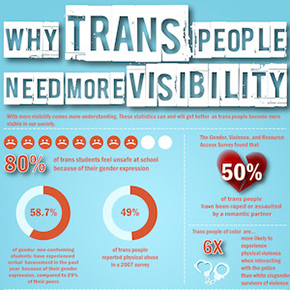Providing Contraception to Trans People
 March 31st is Transgender Day of Visibility. This is a day of empowerment, a day to bring attention to the trans people around the world, and to spread knowledge of the trans community.
March 31st is Transgender Day of Visibility. This is a day of empowerment, a day to bring attention to the trans people around the world, and to spread knowledge of the trans community.
In honor of Transgender Day of Visibility, we are sharing with you our guide to clinicians on providing contraceptive care for LGBT patients. This Contraceptive Pearl (our monthly clinical publication) was originally published in July 2015. Like all of our Contraceptive Pearls, it is short and to the point, providing clinicians with practical evidence-based, patient-centered information they can use when caring for their patients.
Contraceptive Care for LGBT Patients
When providing contraceptive counseling to lesbian, gay, bisexual, and transgender patients, providers should take care to establish rapport and use patients’ preferred name and gender pronoun. Especially for transgender patients, ask the patient how they would prefer to refer to their body parts, and use that language.
Reproductive health care should focus on behavior rather than identity. Specific sexual behaviors may result in unplanned pregnancy, with no regard for categories/groups. For example, transgender men and transmasculine patients may be able to conceive, even while taking testosterone. The copper IUD or other non-hormonal methods would be good contraceptive options for patients who are on testosterone.
Adolescents who have sex with both sexes have higher rates of unplanned pregnancy than peers who have sex only with the opposite sex. Teens who have sex with same-sex partners may not identify as gay/lesbian. The discordance between identity and behavior declines somewhat with age. Providers should avoid making assumptions based on identity and instead, focus on patients’ specific needs, as determined by their behavior.
Access this Contraceptive Pearl online (including citations and resources) or explore other Contraceptive Pearls on our website.
